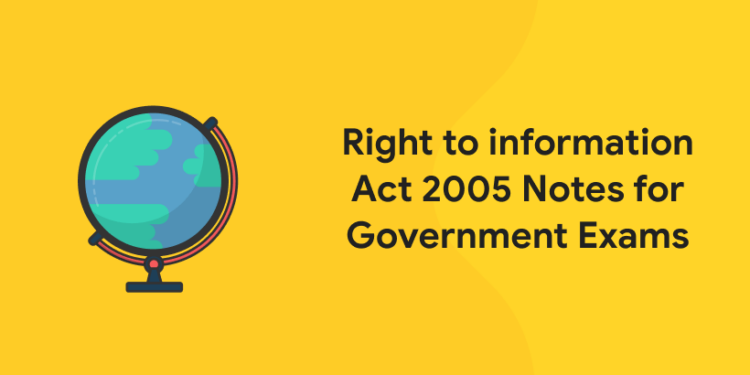Table of Contents
The Right to Information Bill was presented in the Lok Sabha in December 2004. It was approved by both houses of Parliament with major alterations in May 2005. The sanction of the President was obtained on June 15 and the Act was notified in the Gazette on June 21. The law will become effective by mid-October 2005. Read the article below will help you to prepare Right to information Act 2005 Notes for Government Exams
Click here to access right to information act 2005 study notes PDF
This law was approved by Parliament to allow citizens to use their fundamental right to information held by public establishments all over the nation (J&K is not included). The RTI Act intentions to bring about transparency in the working of public establishments, reduce corruption and hold Governments and their departments answerable to public. It fashions a procedure for imparting information to citizens.
Click here to know more about government exams
The RTI Act gives the officers the duty to provide information to individuals both proactively and upon entreaty. It offers a two-tier appeals mechanism to deal with grievances of unreasonable rejection of applications for information by public authorities. This law will have a superseding effect vis-à-vis the Official Secrets Act, 1923 and all other laws and orders passed by Governments that control information flow to the public
Any establishment owned, operated or substantially financed directly or indirectly by the government of central, state or local self-government will come under application of the right to information act 2005. Information involving a private institution that can be accessed by a government authority under any law in power is also encompassed by the RTI Act. The information which cannot be refused to Parliament or State Legislature shall not be refused to any individual.
Click here to read similar GK Blogs for SSC, TNPSC, RRB etc
Records, documents, memos, emails, opinions, advice, press releases, circulars, orders, logbooks, contracts, reports, papers, samples, models and data material held in any electronic form is classified as information under the act.
Grounds of rejection
1)Data that would disturb the sovereignty, integrity, security, scientific or economic interest and relation with a foreign nation
2) Info which would lead to the commission of a crime
3) Information whose publication is prohibited by a court or tribunal or revelation which might be considered contempt of court
4) Information whose announcement may lead to a disruption in of privileges of Parliament or State Legislatures.
5) Marketable and trade secrets, intellectual property etc. that would damage the competitive situation of the third party.
6) Data available to a person in his fiduciary relationship
7) Data received as classified information from a foreign government
8) If information disclosure jeopardizes the life and physical wellbeing of any individual
9) If it is about a source of information or aid given in confidence of law enforcement or security intentions
10) If it is likely to hinder investigation and prosecution procedures
11) Cabinet Documents including negotiations of Ministers, Secretaries and other officers
12) Personal or private information is subjected to greater public curiosity. It is to be decided by the Public Information Officer.
13) If delivering information oversteps the copyright of any person other than the State.
If public interest overshadows harm to the public authority, data must be divulged. The authority to choose is with the Public Information Officer and the Appellate Authorities.
Excluded
1: Who was the first woman President of India?
- IB
- RAW
- Directorate of Revenue Intelligence
- Central Economic Intelligence Bureau
- Enforcement Directorate
- Narcotics Control Bureau
- Aviation Research Centre
- Special Frontier Force
- BSF
- CRPF
- ITBP
- CISF
- NSG
- Assam Rifles
- Special Service Bureau
- CID Special Branch of Andaman and Nicobar Islands
- CID Crime Branch of Dadra Nagar Haveli Special Branch
- Lakshadweep Police
- But information concerning corruption and human rights must be provided but only with the approval of the Central or State Information Commission.
Click here to learn strategies for efficient learning
Public Information Officer (PIO)
- PIO must be chosen by every Public Authority at the level of administrative units or offices under it.
- Assistant PIO must be chosen at the sub-divisional or sub-district level by the Public Authority.
- PIO has primary authority to determine whether disclosure of info is in the public interest or not. (relevant to information covered by exemptions).
- PIO has the authority to decide which parts of a document enclosed by the exemption clause could be divulged to the applicant.
- Any officer whose aid has been required by the PIO for securing information will also be considered as a PIO and is accountable to be punished for not providing information in time or for refusing data or for giving incorrect or misleading information.
Application process
- Apply in writing or electronically in English or the local official language of the area where the application is being made.
- The motive for looking for information need not be given.
- Pay fees as given (if not below the poverty line)
Time Limit
- 30 days from the date of application
- 48 hours for information concerning the life and liberty of a person
- Time taken for calculation of fees and intimation of the same to the applicant will be excluded from the 30 days
- If the interests of a third party are included then the time limit will be 40 days (maximum period + time given to the third party to make representation)
- No action on the application for 30 days is a considered rejection
- Internal Appeal: First appeal to the officer directly senior to PIO in the involved Public Authority within 30 days from the date of latter’s verdict
- External Appeal: Second appeal to the Central or State Information Commission within 90 days of the date on which the decision was given or should have been made by the Appellate Authority.
Central Information Commission
- CIC comprises 1 Chief Information Commissioner (CIC) and about 10 Information Commissioners (IC) who will be selected by the President of India.
- Oath of Office will be administered by the President of India fitting to the form set out in the Schedule.
- The appointment committee comprises the Prime Minister (Chairman), Leader of the Opposition in the Lok Sabha and one Cabinet minister to be designated by the Prime Minister. (if Leader of Opposition position is vacant then the Leader of the largest group in Opposition in the Lok Sabha can occupy their position)
- Candidates must be renowned individuals in public life with knowledge and experience in law, science, technology social service, management, journalism mass media or administration and governance
- No MP or MLA can be selected CIC or IC in the course of their term of service. They will have to resign that post upon selection to the Information Commission.
- CIC is selected for 5 years from the date of joining the office. IC will give up office upon reaching 65 years of age even if the term of office is not finished.
- CIC is ineligible for reappointment.
- The term may be extended by one more year if recommended by the Appointment Committee.
- Remuneration will be of the same level as that of the Chief Election Commissioner
- After the end of the term, CIC will be eligible for appointment to other offices of government.
- Can be removed on grounds of misbehaviour or incapacity. Making a profit from a Governmental contract or a private contract during the term of office constitutes misbehaviour. [But earning from investment in companies is allowed.]
State Information Commission
- The State Information Commission will have 1 State Chief Information Commissioner (SCIC) and about 10 Information Commissioners to be appointed by the Governor.
- The Appointments Committee will be led by the Chief Minister. Other members comprise the Leader of the Opposition and one Cabinet Minister nominated by the Chief Minister.
- The eligibility and terms and conditions of service continue the same as that of the Central Commissioners.
- The remuneration of the State Chief Election Commissioner will be the same as that of an Election Commissioner. The remuneration of the State Information Commissioner will be the same as that of the Chief Secretary of the State Government.
- The Governor has the authority to remove an SCIC or other ICs in the same way as in the instance of the Central Information Commissioners with a reference to the Supreme Court.
CIC will direct the annual report to the Central Government on the application of the provisions of this law at the conclusion of the year. Similarly, SCIC will send a report to the State Government. Central Government will submit the CIC report before Parliament after the end of the year. The concerned State Government will submit the report of the SCIC before the legislative assembly (legislative council too, if there is one).
Every PIO will have to pay a fine of Rs. 250/day up to a maximum of Rs. 25,000/- for
- rejecting an application without the right reason
- delaying information release with no acceptable reason
- intentionally giving inadequate, wrong or misleading information
- destroying data that has been requested
- hindering the furnishing of data in any way.
- The (IC) at the Centre and the State levels will have the authority to levy this penalty. The Information Commission can also suggest disciplinary action for continued breach of the law against an erring PIO.
For getting more detailed information, it is advisable to read the right to information act 2005 pdf available on official sites of the Government of India. Download the Entri App for watching video lectures and attempting the mock tests on the right to information act 2005











